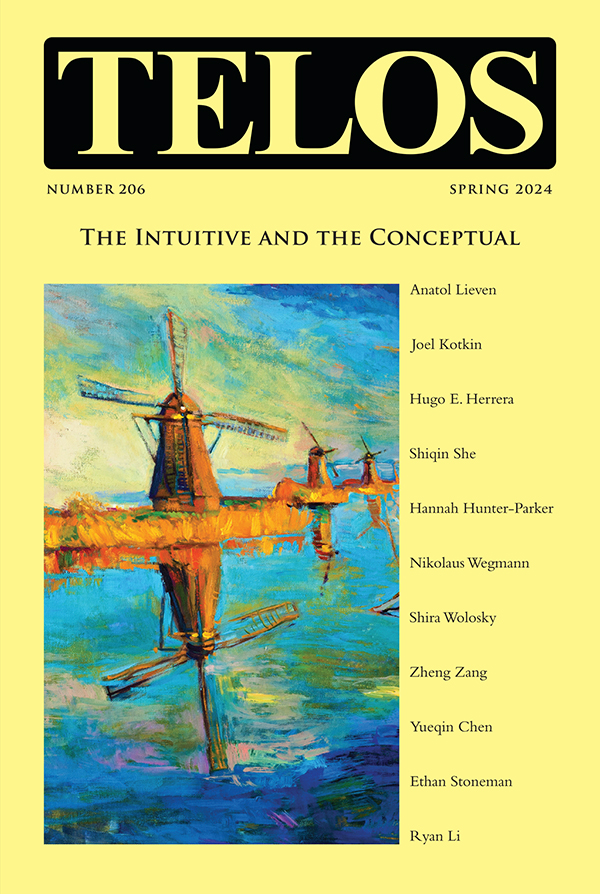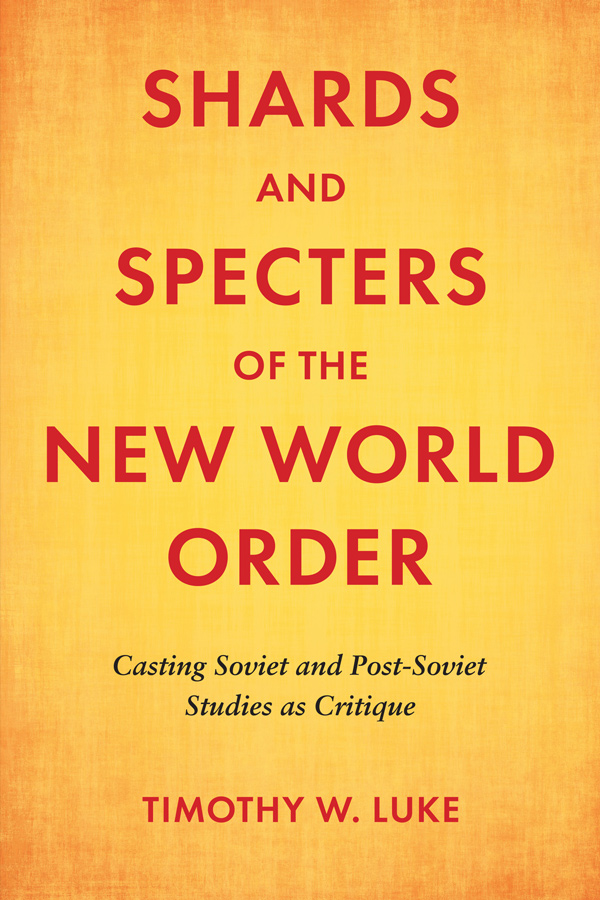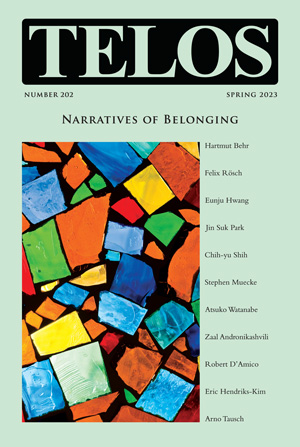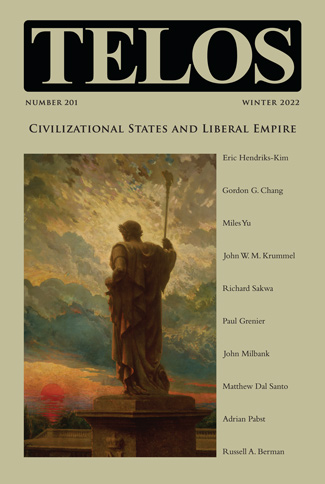By David Pan · Friday, April 5, 2024 Telos 206 (Spring 2024): The Intuitive and the Conceptual is now available for purchase in our store. Individual subscriptions to Telos are also available in both print and online formats.
 We often have the experience of intuiting something without being able to precisely define what that intuition is. Sometimes this intuition leads to a more well-defined insight, and sometimes it might lead to some kind of action, even in the absence of clear conceptual definitions. Yet it is difficult to ascertain what kind of knowledge or awareness such intuitions consist of. What is an intuition as opposed to a defined concept of something? How seriously should we take such intuitions? Are they something separate and qualitatively different than concepts? Are they just fuzzy concepts? Do they really exist at all? These are crucial questions because they lead to conclusions about the status of concepts themselves. If the alternative to clear concepts is nothing at all, then the sociopolitical corollary would be that the alternative to conceptual knowledge and the holders of such knowledge would also be nothing at all. By contrast, if intuitions are separate from concepts and real, then expert knowledge might possibly have some deficiencies in comparison with intuitions. The essays in this issue of Telos explore in one way or another this question of the status of conceptual knowledge as opposed to intuitive awareness. We often have the experience of intuiting something without being able to precisely define what that intuition is. Sometimes this intuition leads to a more well-defined insight, and sometimes it might lead to some kind of action, even in the absence of clear conceptual definitions. Yet it is difficult to ascertain what kind of knowledge or awareness such intuitions consist of. What is an intuition as opposed to a defined concept of something? How seriously should we take such intuitions? Are they something separate and qualitatively different than concepts? Are they just fuzzy concepts? Do they really exist at all? These are crucial questions because they lead to conclusions about the status of concepts themselves. If the alternative to clear concepts is nothing at all, then the sociopolitical corollary would be that the alternative to conceptual knowledge and the holders of such knowledge would also be nothing at all. By contrast, if intuitions are separate from concepts and real, then expert knowledge might possibly have some deficiencies in comparison with intuitions. The essays in this issue of Telos explore in one way or another this question of the status of conceptual knowledge as opposed to intuitive awareness.
Continue reading →
By Telos Press · Friday, December 22, 2023 Now available: Shards and Specters of the New World Order, by Timothy W. Luke. Order the paperback edition today in our online store and save 20% by using the coupon code BOOKS20. Also available in Kindle ebook format at Amazon.com.
Shards and Specters of the New World Order: Casting Soviet and Post-Soviet Studies as Critique
by Timothy W. Luke
 From ideological dynamics in revolutionary Russia, cultural stagnation in the USSR, and ineffective Soviet governance in the 1980s to the USSR’s institutional collapse in 1991, the emergence of the Russian Federation under Boris Yeltsin, and Vladimir Putin’s wars in Ukraine since 2014, Timothy W. Luke’s Shards and Specters of the New World Order investigates how the geopolitical clout of the United States has worked to contain, but at other times sustain, the Soviet Union and later the Russian Federation. Luke’s critical studies also examine how Moscow’s strategies provoked radical Islamic resistance movements in Afghanistan and aided anti-Western client states, like Iraq and Syria, that threatened the New World Order envisioned in Washington after 1991. From ideological dynamics in revolutionary Russia, cultural stagnation in the USSR, and ineffective Soviet governance in the 1980s to the USSR’s institutional collapse in 1991, the emergence of the Russian Federation under Boris Yeltsin, and Vladimir Putin’s wars in Ukraine since 2014, Timothy W. Luke’s Shards and Specters of the New World Order investigates how the geopolitical clout of the United States has worked to contain, but at other times sustain, the Soviet Union and later the Russian Federation. Luke’s critical studies also examine how Moscow’s strategies provoked radical Islamic resistance movements in Afghanistan and aided anti-Western client states, like Iraq and Syria, that threatened the New World Order envisioned in Washington after 1991.
Continue reading →
By Telos Press · Wednesday, April 12, 2023 Telos 202 (Spring 2023): Narratives of Belonging is now available for purchase in our store. Individual subscriptions to Telos are also available in both print and online formats. Online subscribers have access to the full issue at the Telos Online website. The following is an excerpt from the issue’s introduction by Hartmut Behr and Felix Rösch, who are the issue’s guest editors.
Introduction: Narratives of Belonging—The Interrelation between Ontological-Epistemological Observations and Narrative Methodology
Hartmut Behr and Felix Rösch
1. Introduction
 In a recent editorial, the Lancet reported that one of the consequences of pandemics is the detrimental impact “on the mental health of affected populations,” and the current COVID-19 one is no different. Since its outbreak at the end of 2019, “depressed mood, anxiety, impaired memory, and insomnia” are constant companions of people around the world. Many even experience “stress, burnout, depression, and post-traumatic stress disorder.” Amongst its concerns, the Lancet notes the rising “misuse of substances” as a consequence of these mental health problems.[1] One of the reasons for this global mental health crisis is the way the pandemic affects peoples’ practices of community building and rituals of belonging. Having to wear masks, being required to keep at least 1.5 meters apart, not being able to meet (vulnerable) friends and family members, and even more drastic measures like weeklong lockdowns fundamentally disrupted everyday lives and reduced opportunities to socialize. What is normally taken for granted is being challenged. Around the world, these measures have been met by increasing demonstrations, often based on conspiracy theories and against commonsense precautions for preventing a potentially lethal disease. This conflict between reasonable precaution and emotional stress and pressure suggests disruptions of common narratives of belonging. In a recent editorial, the Lancet reported that one of the consequences of pandemics is the detrimental impact “on the mental health of affected populations,” and the current COVID-19 one is no different. Since its outbreak at the end of 2019, “depressed mood, anxiety, impaired memory, and insomnia” are constant companions of people around the world. Many even experience “stress, burnout, depression, and post-traumatic stress disorder.” Amongst its concerns, the Lancet notes the rising “misuse of substances” as a consequence of these mental health problems.[1] One of the reasons for this global mental health crisis is the way the pandemic affects peoples’ practices of community building and rituals of belonging. Having to wear masks, being required to keep at least 1.5 meters apart, not being able to meet (vulnerable) friends and family members, and even more drastic measures like weeklong lockdowns fundamentally disrupted everyday lives and reduced opportunities to socialize. What is normally taken for granted is being challenged. Around the world, these measures have been met by increasing demonstrations, often based on conspiracy theories and against commonsense precautions for preventing a potentially lethal disease. This conflict between reasonable precaution and emotional stress and pressure suggests disruptions of common narratives of belonging.
Continue reading →
By David Pan · Monday, January 16, 2023 Telos 201 (Winter 2022): Civilizational States and Liberal Empire is now available for purchase in our store. Individual subscriptions to Telos are also available in both print and online formats.
 In concluding that “All political action has then in itself a directedness towards knowledge of the good: of the good life, or of the good society,” Leo Strauss describes an essential link between power and values. Because the power to make decisions about our future cannot be separated from the fundamental goals and ultimate meaning of our lives, we cannot exercise power that would be divorced from some set of values. Even the narrowest understanding of self-interest must come to terms with one’s own mortality and the meaning of others for our own existence. Consequently, raw power does not exist, as it can only be exercised within some understanding of its purposes. In concluding that “All political action has then in itself a directedness towards knowledge of the good: of the good life, or of the good society,” Leo Strauss describes an essential link between power and values. Because the power to make decisions about our future cannot be separated from the fundamental goals and ultimate meaning of our lives, we cannot exercise power that would be divorced from some set of values. Even the narrowest understanding of self-interest must come to terms with one’s own mortality and the meaning of others for our own existence. Consequently, raw power does not exist, as it can only be exercised within some understanding of its purposes.
When we consider the way in which power functions on a global level, it will also be crucial to understand how a world order will reflect a particular way of structuring the relationship between values and power. Even the seemingly most egregious use of power can only take place within the framework of an attempt to realize values in the world, and realist accounts of global order must also recognize the importance of some ideology such as nationalism as a means of establishing political values. Accordingly, discussions of balance-of-power dynamics can only begin once great powers emerge as a consequence of the political will of certain peoples to understand themselves in a certain way. Based on such measures as GDP, population, and military spending, Russia does not rank particularly well in relation to countries such as Brazil and India, neither of which pretends to great power status. If Russia can be considered a great power today, it is primarily because of the goals and values that its government embodies. Values form the foundations of global order, and Russia only continues to project its power because it maintains a sense of the global reach of its values for determining order for others.
Continue reading →
By Telos Press · Saturday, September 11, 2021 Telos Zoom Discussion
September 18, 2021
4 pm to 6 pm U.S. Eastern time
Join Telos editors Mark Kelly, Tim Luke, Adrian Pabst, Marcia Pally, David Pan, and David Westbrook for a discussion of the causes of the U.S. failure in Afghanistan and the long-term consequences.
To attend, register here:
https://uci.zoom.us/meeting/register/tJMpf-ivqjMrEtVVTMSia1pfo_L9E2H-bwwk
We look forward to seeing you there.
Continue reading →
By Russell A. Berman · Thursday, August 12, 2021 Renaud Girard is an American-born French journalist, the author of several books on world affairs, especially the Middle East. In this trenchant commentary on the Afghan debacle, he recognizes the defeat for what it is, bluntly invoking the collapse of the imperial German army at the end of the First World War. Is that an overstatement or an unflinching naming of the collapse of an order? Girard brings a realist eye to the factors that have contributed to the current situation, asking us to understand them and their consequences, as the Taliban proceed from city to city, heading toward Kabul.
Continue reading →
|
|
 We often have the experience of intuiting something without being able to precisely define what that intuition is. Sometimes this intuition leads to a more well-defined insight, and sometimes it might lead to some kind of action, even in the absence of clear conceptual definitions. Yet it is difficult to ascertain what kind of knowledge or awareness such intuitions consist of. What is an intuition as opposed to a defined concept of something? How seriously should we take such intuitions? Are they something separate and qualitatively different than concepts? Are they just fuzzy concepts? Do they really exist at all? These are crucial questions because they lead to conclusions about the status of concepts themselves. If the alternative to clear concepts is nothing at all, then the sociopolitical corollary would be that the alternative to conceptual knowledge and the holders of such knowledge would also be nothing at all. By contrast, if intuitions are separate from concepts and real, then expert knowledge might possibly have some deficiencies in comparison with intuitions. The essays in this issue of Telos explore in one way or another this question of the status of conceptual knowledge as opposed to intuitive awareness.
We often have the experience of intuiting something without being able to precisely define what that intuition is. Sometimes this intuition leads to a more well-defined insight, and sometimes it might lead to some kind of action, even in the absence of clear conceptual definitions. Yet it is difficult to ascertain what kind of knowledge or awareness such intuitions consist of. What is an intuition as opposed to a defined concept of something? How seriously should we take such intuitions? Are they something separate and qualitatively different than concepts? Are they just fuzzy concepts? Do they really exist at all? These are crucial questions because they lead to conclusions about the status of concepts themselves. If the alternative to clear concepts is nothing at all, then the sociopolitical corollary would be that the alternative to conceptual knowledge and the holders of such knowledge would also be nothing at all. By contrast, if intuitions are separate from concepts and real, then expert knowledge might possibly have some deficiencies in comparison with intuitions. The essays in this issue of Telos explore in one way or another this question of the status of conceptual knowledge as opposed to intuitive awareness. 









